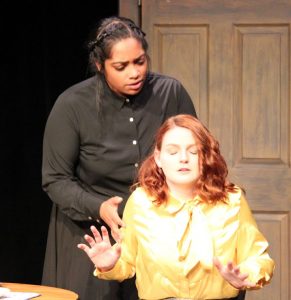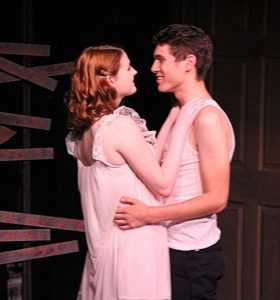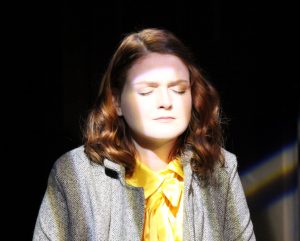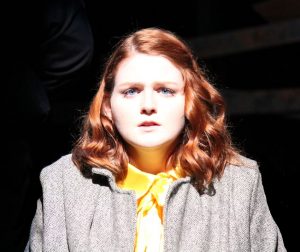Ninety years later, ‘Machinal’ still resonates with female viewers
 FGCU TheatreLab will perform Sophie Treadwell’s Machinal at 7:30 p.m. on February 15, 16, 22 & 23 and at 2:00 p.m. on February 17, 23 & 24. The dark and dire Expressionist drama features a talk-back following the February 23 matinee.
FGCU TheatreLab will perform Sophie Treadwell’s Machinal at 7:30 p.m. on February 15, 16, 22 & 23 and at 2:00 p.m. on February 17, 23 & 24. The dark and dire Expressionist drama features a talk-back following the February 23 matinee.
“The play was inspired by a murder,” divulges Assistant Professor of Theatre Dan Bacalzo, who directs the play. “When Sophie Treadwell premiered it on Broadway in 1928, the nation was still talking about  the trial, held just the previous year. Audience members entered the theatre knowing that’s what it was about. It was no so much a ‘whodunnit’ as a ‘why was it done.'”
the trial, held just the previous year. Audience members entered the theatre knowing that’s what it was about. It was no so much a ‘whodunnit’ as a ‘why was it done.'”
It’s not a true crime story. Treadwell changed the names and other identifying details to protect the innocent … and the guilty. But in her estimation, the murder itself was the least important detail for purposes of the message she wanted to convey.
“Instead, the playwright wants you to focus on the young woman at the heart of the tale,” continues Bacalzo.
 “Her name, we eventually find out, is Helen. There is nothing extraordinary about her. And she faces life choices that are typical of women of the 1920s – the era in which the play was written and takes place. Helen follows the prescribed that seems laid out in front of her – to a point.”
“Her name, we eventually find out, is Helen. There is nothing extraordinary about her. And she faces life choices that are typical of women of the 1920s – the era in which the play was written and takes place. Helen follows the prescribed that seems laid out in front of her – to a point.”
But from her standpoint, the young woman feels that she’s compelled to submit to a life that’s predetermined, as if she is merely a cog in a machine that can only fulfill one purpose.
 “In 2019, women have a broader array of choices available to them,” Bacalzo observes. “But there remains resonance with the past, as it’s still possible to get caught up in society’s dictates regarding expected gender roles and behavior.”
“In 2019, women have a broader array of choices available to them,” Bacalzo observes. “But there remains resonance with the past, as it’s still possible to get caught up in society’s dictates regarding expected gender roles and behavior.”
But in the final analysis, the play’s not as concerned with the specific norms and mores that society imposes, but the consequences a woman faces when she chooses to break away from them and follow her  own life script instead. What makes Machinal so riveting, however, is that the story focuses not on objective reality, but on Helen’s subjective response both to the rules she feels oppressed by and society’s reaction to her rebellion.
own life script instead. What makes Machinal so riveting, however, is that the story focuses not on objective reality, but on Helen’s subjective response both to the rules she feels oppressed by and society’s reaction to her rebellion.
“Machinal is an Expressionist drama,” Bacalzo explains. “What this means is that the viewpoint of the story is distorted through the lens of the protagonist. It is her subjective reality that we primarily experience. This manifests in a variety of ways in both script and production, and has made for an exciting rehearsal process with this group of dedicated students.”
 Bacalzo, who serves as FGCU’s Theatre Program Coordinator, teaches theater history and was drawn to the play, in part, because of Machinal’s storied provenance. Since it was first performed in 1928, it has been revived a number of times, including Off Broadway runs in 1960 and 1990, a Broadway revival in 2014 and most recently in London last year. Machinal was included in Burns Mantle’s The Best Plays of 1928–29. The Broadway production received four Tony nominations.
Bacalzo, who serves as FGCU’s Theatre Program Coordinator, teaches theater history and was drawn to the play, in part, because of Machinal’s storied provenance. Since it was first performed in 1928, it has been revived a number of times, including Off Broadway runs in 1960 and 1990, a Broadway revival in 2014 and most recently in London last year. Machinal was included in Burns Mantle’s The Best Plays of 1928–29. The Broadway production received four Tony nominations.
 But Bacalzo loves the script itself and the way it continues to resonate with women across a 90-year generational divide. For many, Helen’s monotonous, unfulfilling life, shaped and governed as it is by inflexible societal expectations, is eerily similar to their own circumstances– or those experienced by their own mothers, daughters, sisters and friends. Others have experienced the way that society, law enforcement and the legal justice system
But Bacalzo loves the script itself and the way it continues to resonate with women across a 90-year generational divide. For many, Helen’s monotonous, unfulfilling life, shaped and governed as it is by inflexible societal expectations, is eerily similar to their own circumstances– or those experienced by their own mothers, daughters, sisters and friends. Others have experienced the way that society, law enforcement and the legal justice system  can come down like a ton of breaks on deemed transgressions of society’s expectations and demands.
can come down like a ton of breaks on deemed transgressions of society’s expectations and demands.
Tickets are $10 for the general public and $7 for students.
February 15, 2019.














 Tom Hall is both an amateur artist and aspiring novelist who writes art quest thrillers. He is in the final stages of completing his debut novel titled "Art Detective," a story that fictionalizes the discovery of the fabled billion-dollar Impressionist collection of Parisian art dealer Josse Bernheim-Jeune, thought by many to have perished during World War II when the collection's hiding place, Castle de Rastignac in southern France, was destroyed by the Wehrmacht in reprisal for attacks made by members of the Resistance operating in the area. A former tax attorney, Tom holds a bachelor's degree as well as both a juris doctorate and masters of laws in taxation from the University of Florida. Tom lives in Estero, Florida with his fiancee, Connie, and their four cats.
Tom Hall is both an amateur artist and aspiring novelist who writes art quest thrillers. He is in the final stages of completing his debut novel titled "Art Detective," a story that fictionalizes the discovery of the fabled billion-dollar Impressionist collection of Parisian art dealer Josse Bernheim-Jeune, thought by many to have perished during World War II when the collection's hiding place, Castle de Rastignac in southern France, was destroyed by the Wehrmacht in reprisal for attacks made by members of the Resistance operating in the area. A former tax attorney, Tom holds a bachelor's degree as well as both a juris doctorate and masters of laws in taxation from the University of Florida. Tom lives in Estero, Florida with his fiancee, Connie, and their four cats.